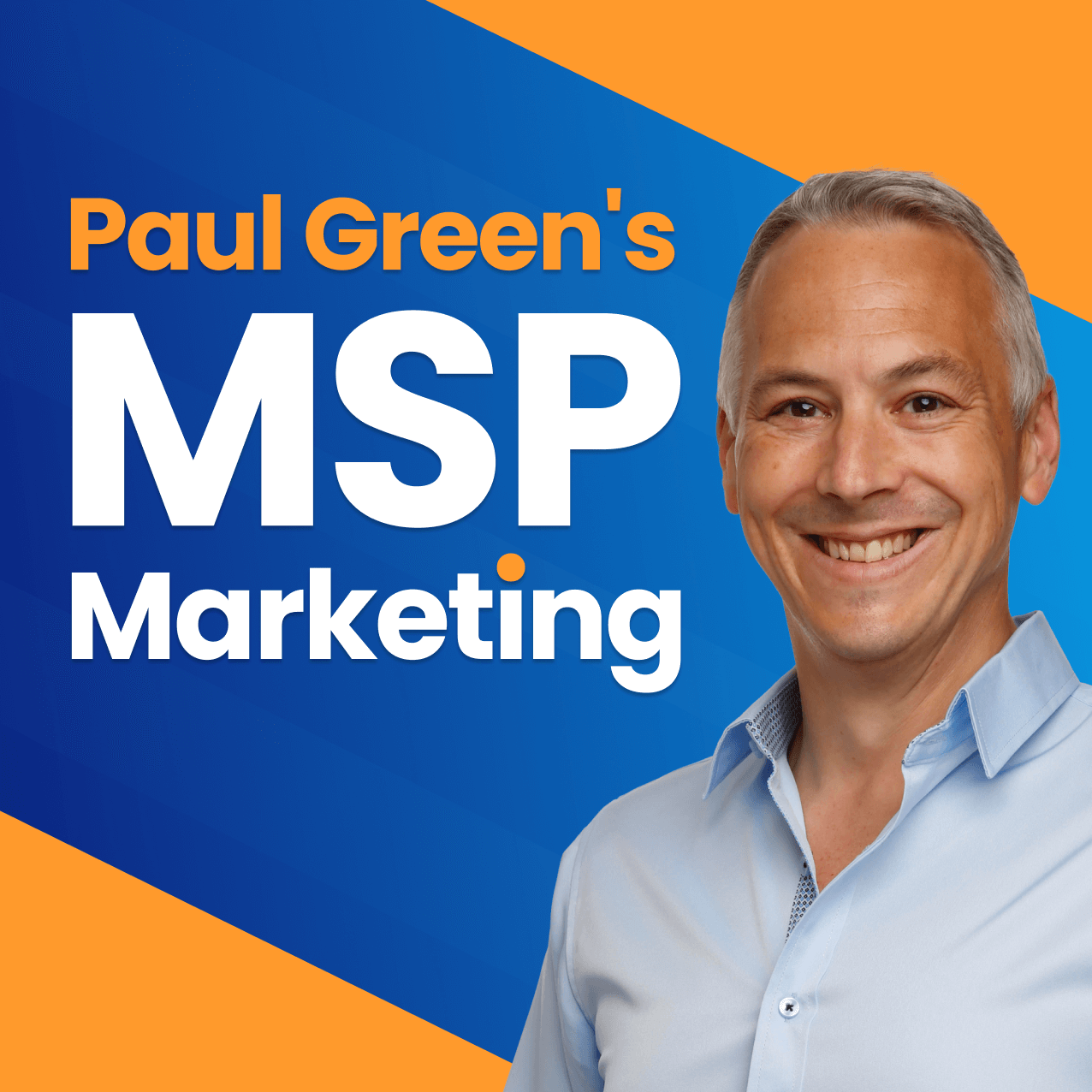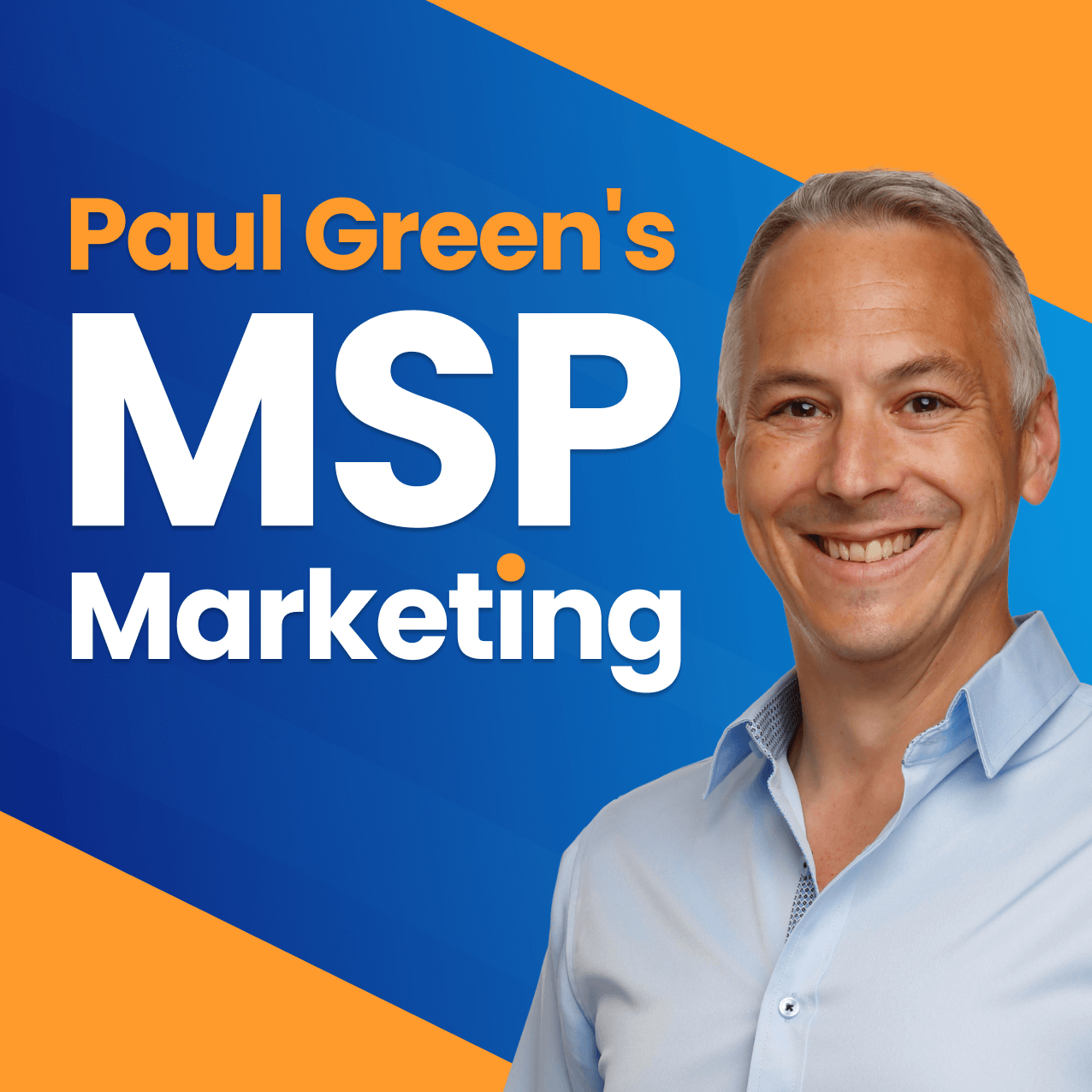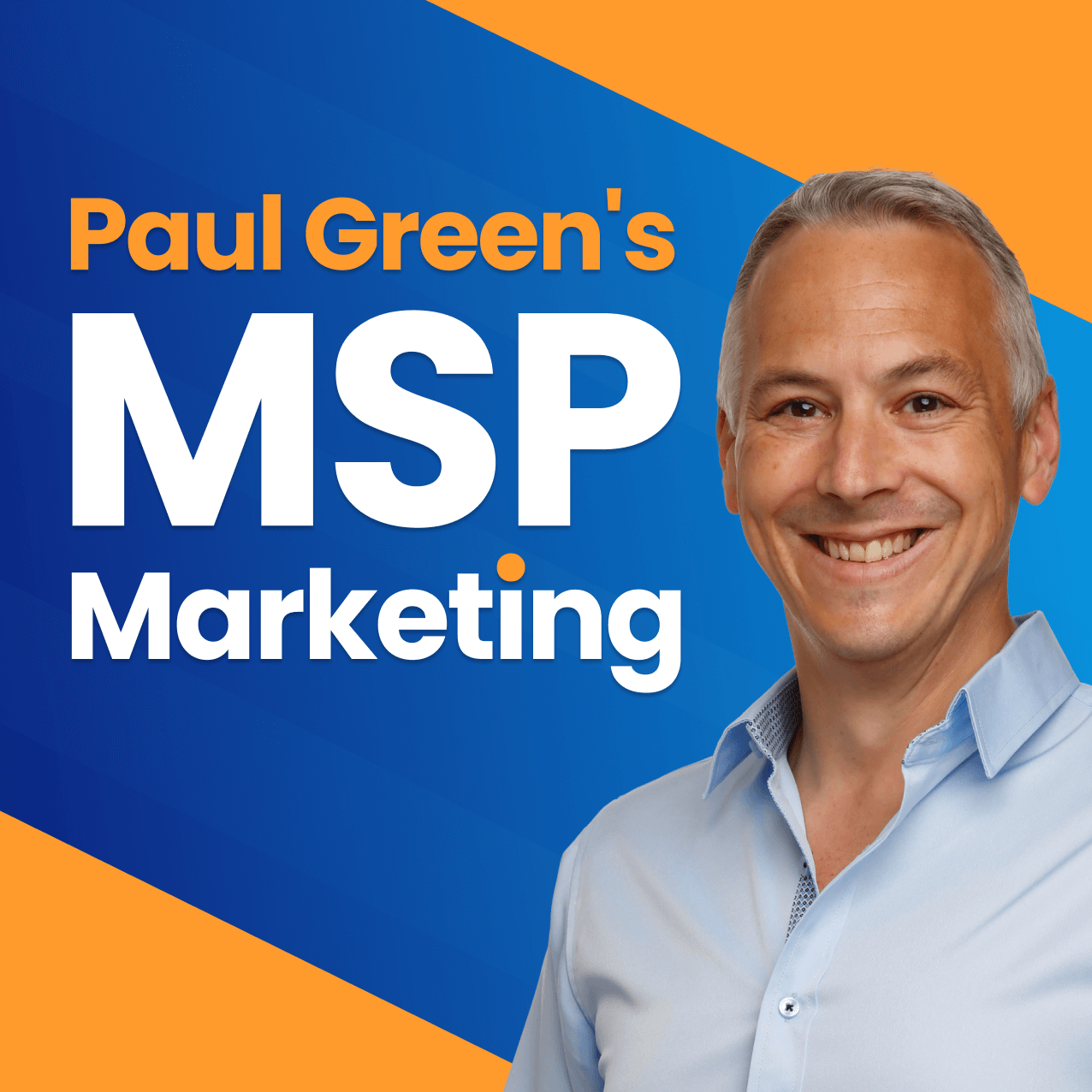A mini masterclass on LinkedIn for MSPs
Description
The podcast powered by the MSP Marketing Edge
Welcome to Episode 262 of the MSP Marketing Podcast with me, Paul Green. This week…
- A mini masterclass on LinkedIn: Improve these three things on your LinkedIn profile to get people’s attention and encourage them to engage with you.
- The 3 tests to apply to new initiatives: The fear test, the regret test, and the comfort zone test – will these push you into taking the next big leap for your MSP?
- Should you start a podcast for your MSP?: Podcasts are a great way to grow relationships with an audience, but is it the right thing for your MSP?
- Paul’s Personal Peer Group: Stuart from an MSP in Atlanta has asked how much he should be paying for a content writer. Find out more on this and whether AI is a good tool to use too.
A mini masterclass on LinkedIn
It’s very easy to become complacent about social media and believe that it’s just a waste of time to a busy business owner like you who’s trying to build their MSP.
But the reality is that social media is still incredibly important.
Not all the networks, of course. I really don’t think most MSPs will get much from TikTok for some time, at least not until the generation that’s growing up with TikTok are the decision makers.
For B2B marketing in 2024 and next year as well the social media network to go for is of course…
LinkedIn – this is still the very best platform for MSPs looking for new clients, and I do highly recommend that you put in time on it every single day.
Let’s spend a few minutes now on a mini masterclass on LinkedIn, and I’ve got three things for you to look at.
The first is to improve three things in your profile. So here’s an interesting question. Based on your current profile, if you were an ordinary business owner or manager, would you want to be a client of your MSP? If not, here are three areas to spend more time on: The headline – focus on the benefit to your prospects rather than what you do. “I do IT for town businesses”, becomes “Helping town businesses grow with technology”. Then look at your headshot and don’t be cheap – pay a professional who does headshots every day and can make you look beautiful. Your about us bit – write it for your prospects, not other IT professionals. You want them to read it and think, ah, this is exactly the kind of person I want looking after my business.
Next up then, is to build your personal brand. And your personal brand is what others think about you. It’s not something you control, but it is something that you can heavily influence. And it’s based on a number of factors: the number of connections you have, the recommendations that you have, what you post about, and how often you post, the value of your contributions, the speed of your responses, and whether you do something like a LinkedIn newsletter or a LinkedIn live. Because people who are perceived as experts, they do these things. Now, like much of marketing, getting better results is about doing a series of small actions on a regular basis, for years. I spend no more than about 15 to 20 minutes a day on LinkedIn. I have a virtual assistant who does functional stuff like accepting connection requests. I just do new content and commenting.
In the early days, this felt like a waste of time, but today I have two sizable and engaged audiences – my connections and my LinkedIn newsletter subscribers. And these have only come from doing the work day in, day out for years whether I wanted to or not. Building your personal brand on LinkedIn is really no different to building your body at the gym. The magic happens over time, not on the day that you do the work. And of course, most people give up long before they see the results. Your opportunity is to be the only MSP in your area who does the opposite. You just keep putting in the work, the results are going to come.
And then the final thing to look at is ideas for content, for posts. There’s a lot of noise on LinkedIn, the same as any digital platform, so to cut through you must be creative and not just do what everyone else is doing. Here are five post ideas for you. Take each one and ask yourself, how can I put my own spin on this?: Educate them about something – don’t be technical. Celebrate a win = this could be a new client or protecting an existing client from a nasty cyber attack. Be thankful for something. Document what’s happening in your professional life. And the fifth one, occasionally share something from your private life – and no, not what you’re having for dinner, something that matters.
The 3 tests to apply to new initiatives
At the beginning of October, I was privileged to present the keynote marketing talk at the very first Scale Con in Las Vegas. Oh my goodness, that was such good fun. Because not only did I get to hang out with loads of other marketing and sales experts from around the world, but there were a couple of hundred MSPs there as well. And I spent three days meeting people I’ve known for years on forums or video calls, but never actually met in real life, as well as meeting brand new friends. And by the way, they are definitely doing a Scale Con ‘25. I will be speaking again, and you should really go to that if you can.
I tried very hard to catch a little bit of each of the speakers across the three days of the event, and I think there were well over 20 different speakers in all. And I always believe that speakers are like books. When you read a book, even if it’s something that you’ve read or studied before, there’s always a new idea that comes out of it and it’s no different when you’re listening to speakers talk. And there were some pretty awesome speakers. My brain even now is still full of ideas from that event.
Now, one of the biggest and best ideas was from Nigel Moore from The Tech Tribe, and it’s no surprise really, Nigel is just a stunningly inspirational character. And side note, it was so cool just hanging out with him, catching up with him only very briefly, but across the three days. And then on the third day, he did the final closing keynote and it was an insanely good keynote. I’m not being very humble here, but I thought mine was good, and yet I need to up my game after seeing what Nigel did.
One of the many things that he talked about is three tests that he applies to whether or not he should do something new. And these are: the fear test, the regret test, and the comfort zone test. If he’s looking at a new initiative that he’s thinking of doing, he’ll say, right, if I do this, does it scare me a little bit? Does it give me a little bit of fear? Fear is good because it shows that you’re doing something completely brand new, something you’ve never done before. If I don’t do this, will I regret that when I’m old? And then of course, the comfort zone test is will he regret not pushing himself out of his comfort zone?
So if you are looking at a new initiative for your MSP, it’s the same three tests… if you do this, will it create some fear? Will it create some regret if you look back in later life and you haven’t done it? And will it push you out of your comfort zone? I’ve had so many big ideas from that event that I’m now applying those tests to them as we speak. And I think that you can do the same, don’t you?
If you’re not asking those questions at least two or three times a year, maybe you’ve plateaued. Maybe you’re stuck in the comfort zone.
If I look back at my career, nearly 20 years of owning a business, as much as I’ve been constantly working towards stability and a business that thrives whether I’m there or not, which is a very stable business, the big leaps have come from pushing myself out of my comfort zone. And that doesn’t always mean that the big leaps are the right things to do, but certainly they kick off new actions and new directions, which can take your business to a very exciting place.
Should you start a podcast for your MSP?
Featured guest: Kieran MacRae is a podcast marketing coach on a mission to help you solve the podcast marketing puzzle.
He shares all the best advice for growing your podcast, without spending hundreds of hours and burning yourself out.
Kieran and his wife have grown a niche Scottish History podcast to over 16,000 monthly downloads and he wants to help you do the same.
It seems kind of weird to discover that podcasts have been around for 21 years. The first ever podcast started in 2003 when the audio RSS feed was created. And they’re now so popular that every year more than 500 million people listen to a podcast. So perhaps it’s inevitable that at some point you’ve wondered whether you should start a podcast for your MSP.
Let me tell you, a lot of work goes in behind the scenes to make our podcast happen every single week, but it is worth it. And if you have a passion for podcasting, and especially if you have a vertical that you serve, a podcast could be very powerful for you. My guest today is going to explore starting a podcast. He’ll tell you the classic mistakes first time podcasters make. And which is more important – presenting style, content or kit.









